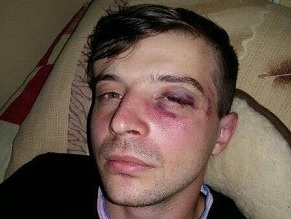|
World Jewish News

Victim of the homophobe attack on the Queer Home Krivbas community center, located in Kriviy Rig (photo from Facebook, published with permission).
|
Human rights advocates on xenophobia in Ukraine: situation stable; some factors cause for concern
08.10.2015, Anti-Semitism The National Minority Rights Monitoring Group has published the quarterly midline report on manifestations of xenophobia in Ukraine in July-September 2015.
According to the results of the Group’s monitoring of minority rights violations, xenophobia, and hate crimes, the situation in Ukraine in the third quarter of the current year remains stable, even though some factors are a cause for concern.
Autonomous Republic of Crimea.
Concern is the most high about the Russian-annexed Crimea, where the occupants continue systematic repressions of the independent Crimean Tatar movement and its representatives. The so-called “Case of February 26th” remains, as in the first half of 2015, one of the main instruments of repression. The case was opened against the activists who went out on a rally in front of the Crimean Parliament in support of the unity of Ukraine right before the Russian intervention began in the winter of 2014. Some of the suspects, particularly the Mejlis deputy chairman Akhtem Chiygoz, are under arrest. The investigation is also being used to put indirect pressure on other activists. For example, the chairman of the Central Election Committee of the Crimean Tatar Kurultai, Zair Smilyayev, first deputy of the Mejlis Chairman Nariman Jelyalov, and Mejlis deputy chairman Ilmi Umerov were called in for questioning in regards to this case on the same dates when the World Congress of Crimean Tatars was taking place in Ankara. Activists believe that the peninsula’s puppet regime sabotaged their participation in the event.
Other pretexts are also being used to continue repressions. For example, an imam of a village mosque was sentenced to two years’ probation for criticising the Russian occupation in a private conversation.
After the Mejlis announced a food blockade of Crimea, Natalya Poklonskaya, who calls herself the Prosecutor General of Crimea, forbade the use of the word “Mejlis” and its derivates in the media.
Crimean Tatar rights are constantly being violated in everyday matters. Particularly, a worker was fired from a barber’s shop for speaking Crimean Tatar to his colleagues. This incident gained a wide resonance.
And, finally, Crimean Tatars continue to go missing. On July 19, 2015, the 28-year-old Bitla Umerov left Skvortsovo village (Simferopol region) to go shopping in the city of Simferopol and did not return. On August 27, it became known that the 45-year-old Mukhtar Arisanov had also vanished. According to human rights advocates, 21 Crimean Tatar has gone missing since the occupation of the peninsula began.
Donbass.
Anti-Semitic rhetoric continues to be used on various levels in the self-proclaimed republics. Moreover, leaders of the terrorist groups have gone on record with homophobic statements, particularly from the “president” of the “Donetsk People’s Republic” Alexander Zakharchenko. It can be said that anti-Semitism and homophobia are an integral part of the ideology of the puppet regimes that have been created by Russia in occupied parts of the Donetsk and Luhansk regions.
Anti-Semitic vandalism.
Acts of anti-Semitic vandalism in Ukraine continued being recorded by the monitoring program over the last three months. The most serious cases involved are the arson attempts on Holocaust victim memorials near Melitopol and in Babiy Yar in Kyiv, which utilized incendiary mixtures and car tires. It is especially worrying that none of the criminals who commited acts of anti-Semitic vandalism over the last several years have been found and held liable. Ukrainian leaders, including Prime Minister Arseniy Yatsenyuk, have gone on record multiple times in the last several weeks, saying that they are committed to the security of Jewish sites.
Homophobia.
Human rights infringements and even violence continued to be recorded towards people on account of their sexual orientation and gender identity, whether real or alleged. In Odesa, the court forbade holding the “March of Equality,” a public human rights event that was to be held as part of the queer culture festival “Odessa Pride-2015.” The premises of the Queer Home Odessa Community Center, where the festival’s events were located, were attacked by a group of activists from the All-Ukrainian Union “Svoboda” political party. Earlier, a grenade went off near the entrance of the Odessa “Libertine” club, which has a reputation for being gay-friendly. One of the guards was wounded. The LGBT Association “Liga” had to cancel a planned laying of flowers to a memorial for the heroes of the Heaven’s Hundred, initially planned as part of the Days of Equality and Pride, due to threats from the leader of the local “Right Sector” group. In Krivy Rig, premises that housed LGBT events were brutally attacked; in Kyiv, couples whose behavior was interpreted by the aggressors as “homosexual” were also attacked.
The National Minorities Rights Monitoring Group was created by the Congress of National Communicities of Ukraine (CNCU) in April 2014. It is led by Vyacheslav Likhachev and co-coordinated by Tetyana Bezruk.
|
|
